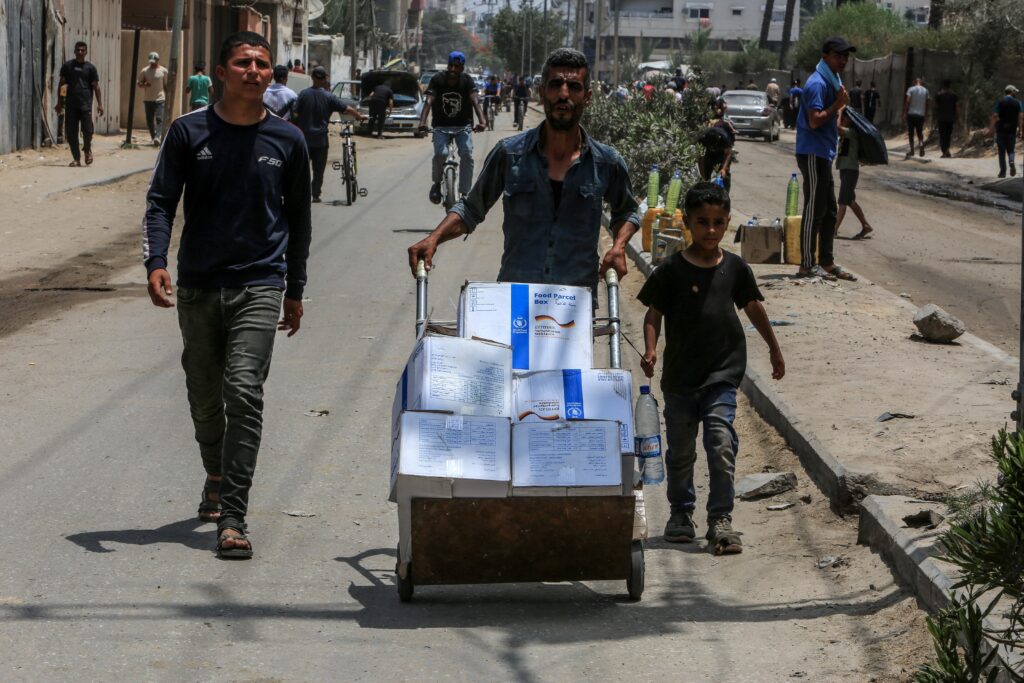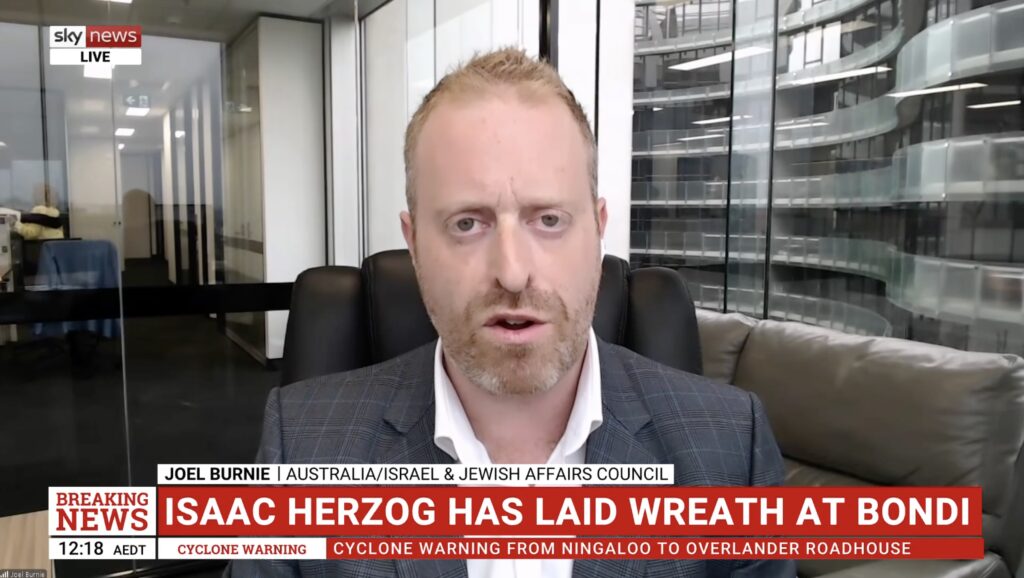UPDATES
Beyond the Vienna nuclear talks with Iran
January 14, 2022 | AIJAC staff

Update from AIJAC
01/22 #01
The 8th round of Vienna talks to revive the Joint Comprehensive Plan of Action (JCPOA) nuclear deal between the P5+1 and Iran that began at the end of December continue to go nowhere due to Iranian stonewalling and failure to put forward serious positions, despite claims by Iran’s Foreign Ministry to the contrary.
While the US State Department and French Foreign Affairs Minister Jean-Yves Le Drian recently said there had been some progress, both have announced that time is running out. Le Drian said talks were moving “too slow” for there to be any realistic prospect of a deal. France, Britain and Germany warned in December that the window for a deal would close “in weeks” due to the pace of Iran’s nuclear advances, something echoed by the US this week.
In fact, International Atomic Energy Agency (IAEA) Director-General Rafael Grossi asserted in May 2021 that a “linear return” to the JCPOA was impossible because of Iranian advances, so the Vienna talks have long been pointless, a comment which calls into question the point of the Vienna talks. Grossi added that there needed to be an agreement on how to address Iran’s improved nuclear strength.
Meanwhile, Iran continues to upgrade its nuclear infrastructure and advance its rocket technology via a space program that, despite Iranian denials, is meant to assist it to develop intercontinental ballistic missiles (ICBMs) as a delivery system for a nuclear warhead.
This Update will deal with the need to plan for an alternative approach, including the military option given the likely imminent failure of talks, and how these developments impact Israel’s security.
We lead with Iran experts Mark Dubowitz and Matthew Kroenig, who argue that the Biden Administration needs to credibly threaten to destroy Iran’s nuclear facilities, which is the only possible way that Iran might agree to a deal. They warn that if Iran obtains a nuclear weapon, it will lead to regional nuclear proliferation and threaten Israel, the Gulf states and eventually the US itself, with Iran’s terrorism and regional destabilisation expanding under its nuclear umbrella. The only answer, they advise, is either to militarily threaten Iran back into a deal or, if that fails, destroy its program entirely. For the full argument, CLICK HERE.
Next, we have former U.S. Special Representative for Iran Elliott Abrams, who warns that the greatest danger to Israel currently is that the US will agree to a “less for less” deal with Iran given the fact that the JCPOA is obsolete and Iran will never agree to its conditions, anyway. Israel, he says, must ensure it expresses disapproval of such an outcome to the US publicly and privately, explaining its danger and making it clear that it will not be bound by any such agreement, while avoiding any rupture in the US-Israel relationship as occurred in 2015 over Iran. To read Abrams’ recommendations on how to go about this, CLICK HERE.
Finally, National Security Analyst Jeremiah Rozman argues that Iran is seeking a nuclear weapon and the ability to deter it from this pursuit is hampered by the different threat perceptions of the P5+1, Israel and the Gulf states as well as Iran’s perception of their respective resolve and capability. Rozman notes that Israel has the resolve and the US has the capability, and advises the best means of deterrence is to marry the two together: increasing Israel’s capabilities and joint military exercises; presenting a unified position; and moving more US assets to the region to underline US resolve. For the full list of policy proposals, CLICK HERE.
Readers may also be interested in…
- Iran’s blossoming relationship with China, what it means for the US and how the US should respond, by Brad Bowman and Zane Zovak.
- Bobby Ghosh on the victory of Moqtada al-Sadr in recent Iraqi elections, the issues he’s likely to cause and face and the consequences for Iranian influence in the country.
- Expert Jonathan Spyer breaks down the current situation in Syria, detailing all the players and their recent moves locally, regionally and internationally, and how these developments impact Israeli interests.
- A Britain Israel Communications and Research Centre (BICOM) briefing on the state of play between the US and Iran, including the JCPOA Vienna talks as well as US warnings to Iran over potential attacks on Americans.
- Colum Lynch explains how quickly Iran could produce a nuclear weapon given its current advances as well as potential technological hurdles.
- Ido Levy on the US policies necessary to ensure the Islamic State doesn’t rise again in the Middle East.
- David Pollock compares the wars in Iraq and Afghanistan and explores why the former has produced some positive policy outcomes while the latter ended in complete catastrophe and defeat.
- Some examples from the many stories and comments now appearing at AIJAC’s daily “Fresh AIR” blog:
- Jamie Hyams and Executive Director Colin Rubenstein explain the BDS movement and its campaign against the Sydney Festival.
- Executive Director Colin Rubenstein analyses the UN’s anti-Israel obsession and the hopes for reform in The Daily Telegraph.
- AIJAC media release welcoming the Sydney Festival’s refusal to cave to BDS.
- AIJAC’s submission to the Parliamentary Joint Committee on Human Rights’ Inquiry into the Religious Discrimination Bill 2021 and related bills.
- AIJAC documents how Australian neo-Nazis like Thomas Sewell support convicted British far-right terrorist Ben Raymond, a member of the proscribed group National Action.
Biden’s Moment of Truth in Iran
With negotiations likely to fail, he’d better be prepared for a military strike.
Mark Dubowitz and Matthew Kroenig
Wall Street Journal – Jan. 6, 2022 6:51 pm ET
Negotiations in Vienna over Iran’s nuclear program started this week and quickly stalled—and little wonder. Tehran is striding toward nuclear weapons and has little interest in a diplomatic breakthrough.
That makes it almost certain that President Biden will soon face the fateful choice between allowing the clerical regime to become a nuclear-weapons power and using military force to stop it. The red line for military action will come when Iran’s timeline to sprint to a nuclear weapon shrinks to less than the Pentagon’s response time. On the current trajectory, that could happen early this year. If and when it does, the president should order military strikes on Iran’s nuclear facilities to prevent Tehran from building the bomb.
The best possible resolution of this crisis would be a negotiated settlement that verifiably and permanently closes off all Iranian pathways to the bomb. But the 2015 nuclear deal failed to do that, and Tehran isn’t interested in any agreement that does.
Meanwhile, time is running out. Iran already could produce one bomb’s worth of weapons-grade uranium in as little as three weeks and test a crude nuclear device in six months. It might take a year or two to fashion a functioning nuclear warhead that is deliverable on a missile, but once the clerical regime has enough weapons-grade material, the game is over. The world could no longer physically prevent Iranian weaponization. Like North Korea, Tehran could move its bomb-grade material to secret facilities and fashion warheads undisturbed. To stop Iranian nuclearization, Washington must stop Tehran from acquiring sufficient quantities of fissile material.
A nuclear-armed Iran would cause further proliferation as regional powers like Saudi Arabia build their own bombs. Backed by the threat of nuclear weapons, Iran would step up its regional aggression and support to terror and proxy groups. With Washington deterred by fear of escalation—including the risk of a nuclear strike against Israel—the clerical regime would have a freer hand. Eventually, as Tehran’s intercontinental ballistic missile program advances, the U.S. itself would be vulnerable to Iranian nuclear attacks and coercion.
Fortunately, Washington has effective military options. There is little doubt the Pentagon can destroy Iran’s nuclear facilities (even those that are deeply buried and hardened), as several defense secretaries have stated.
American strikes would delay Iran’s efforts by years at minimum and forever at best. Tehran can’t enrich uranium without the necessary facilities. It would take time to rebuild, install and operate centrifuges, and reconstitute stockpiles of fissile material. The U.S. government has estimated that an Israeli strike would buy only one or two years, but an American strike would be more effective. And Iran might think twice before spending billions to rebuild facilities the U.S. could destroy again.
Iran would likely retaliate, but the lesson from President Trump’s strike on Gen. Qasem Soleimani two years ago is that Tehran’s response would likely be muted. The attack would stun the Iranian political system since it will be unexpected; Islamic Revolutionary Guard publications now regularly mock American determination. The ruling clerics still fear a major war, which could lead to the destruction of their military and the end of their regime. Washington can further deter retaliation by issuing an explicit threat that if Tehran escalates, the Pentagon will destroy more than the nuclear facilities.
Mr. Biden should publicly ask the Pentagon to update military plans and, alongside allies and partners, conduct exercises targeting mockup Iranian nuclear facilities. He should also ensure that U.S. allies and bases in the region are protected against Iranian counterstrikes. Israel would benefit from help addressing the threat of Iranian precision-guided missiles. Mr. Biden could also broker a deal between Israel and Saudi Arabia on missile and drone technology, which Riyadh needs to defend against Iranian attacks. It could have the added benefit of encouraging the kingdom’s entry into the Abraham Accords.
Military options are most effective when they don’t have to be used. If Tehran understands that diplomatic intransigence will have serious consequences, it will be more likely to negotiate. For those who hold out hope that coercive diplomacy still can solve the Iranian nuclear challenge, putting the military option back on the table, along with a renewed sanctions offensive, is the best bet.
If all else fails, Mr. Biden should be prepared to destroy Iran’s nuclear program. The risks of this approach pale in comparison to the threat of living with a nuclear-armed Iran for decades to come.
Mr. Dubowitz is chief executive of the Foundation for the Defense of Democracies. Mr. Kroenig is a professor of government at Georgetown, director of the Atlantic Council’s Scowcroft Strategy Initiative and a former senior policy adviser at the Pentagon (2017-21).
Israel and the Vienna Talks
Elliott Abrams
The Scroll – 11 January 2022
The nuclear talks with Iran recommence this week, and no two countries have more at stake than Israel and the United States—yet neither is at the table.
The talks will be conducted, as usual, by Britain, France, Germany, Russia, and China, because Iran has refused to talk with the United States. So there is a form of shuttle diplomacy, with the Americans in another hotel, conferring with allied diplomats before and after the sessions.
But for Israel, these talks—and even more so the agreement that may emerge from them—present a great diplomatic as well as security problem. The United States keeps promising Ukraine that while it is negotiating with Russia about the 100,000 Russian troops on Ukraine’s border, it will agree to “nothing about you without you.” That is the catchy refrain; whether it’s an accurate depiction of political reality is another matter. Israel and the United States certainly do consult, very often and at very high levels, about the Iranian nuclear threat, but is this a case of “nothing about you without you,” or might the United States agree to an Iran deal that Israel thinks is dangerous? And if that happens, what should the Israeli position be?
We know, of course, what Israel did the last time this problem presented itself, in 2015. Then, Prime Minister Netanyahu engaged in a very public campaign against the Joint Comprehensive Plan of Action (JCPOA) and against President Obama’s handling of Iran. How should Israel handle things this time?
First, let’s be clear on what constitutes the danger. It is that the United States will agree to what’s called a “less for less” agreement. Restoring the JCPOA in full seems impossible: Iran will not agree; the passage of time since the JCPOA was implemented has rendered some of its provisions far less useful; and Iran’s violations of the JCPOA in recent years have led to progress that cannot be undone. Instead of the “maximum pressure” campaign the Trump administration had underway, in “less for less” the United States would release certain sanctions—for example, allowing Iran to collect about $7 billion it has in frozen accounts in South Korea—if Iran made certain moves, such as halting enrichment of uranium above a low percentage and exporting the uranium it has already enriched above that percentage.
From the Israeli perspective, such a narrow agreement would be a disaster. It does not stop Iranian enrichment. It does not stop replacement of slower, more primitive centrifuges with new generations of centrifuge that enrich far faster and thus would allow Iran to leap forward toward having enough enriched uranium for a bomb whenever it chooses. It does not require Iran to account for the previous military work on a bomb it has clearly done. It does not require Iran to permit full International Atomic Energy Agency inspections, which Iran has prohibited for several years now. Under such a “less for less” agreement, Iran’s progress toward a nuclear weapon would be slowed only very slightly, and the United States (plus the EU3—Germany, France, and the United Kingdom—and Russia and China) would in essence be agreeing to the highly unstable and dangerous status quo.
How should Israel react? First, it should do just what it is doing now: explain patiently, forcefully, and diplomatically why such an agreement is dangerous. This does not require attacks on President Biden nor any moves that would give rise to accusations of partisan intervention in U.S. politics, but Israel’s unhappiness with and disapproval of the kind of deal that is likely—if there is any agreement at all—should be very clear in public and in private.
Second, Israel should be very clear that it will not consider itself bound by such an agreement. It has said exactly that, retaining the right to act to protect itself against Iranian progress toward building a nuclear weapon regardless of the American position or any deal with Iran. This is precisely what Prime Minister Naftali Bennett did on Jan. 10, when he told the press, “In regard to the nuclear talks in Vienna, we are definitely concerned … Israel is not a party to the agreements. … Israel is not bound by what will be written in the agreements, if they are signed, and Israel will continue to maintain full freedom of action anywhere, anytime, with no constraints.”
This does not mean an assault on American diplomacy or American diplomats; it means a flat and sober dissociation of Israel from the agreement. Israel should neither fight American diplomacy nor criticize the U.S. government but should state clearly that Israel was not represented in that diplomacy and will have to take care of itself. As the saying goes, “Nothing about us without us”—or “We are not bound in any way.”
The goal would be to avoid a crisis in U.S.-Israeli relations such as we saw in 2015, or even a deep decline in the official relationship, while creating the clarity Israel should express and retaining the freedom of action Israel needs. On that basis, the United States and Israel as close allies can move forward in confronting the dangers that are very clearly growing as Iran’s nuclear weapons program advances year after year.
Elliott Abrams is a Senior Fellow for Middle Eastern Studies at the Council on Foreign Relations and was the State Department’s Special Representative for Iran in 2020.
Can Iran stall its way to nuclear weapons?
Fully destroying the Islamic republic’s nuclear program is likely to be difficult and costly
Jeremiah Rozman
Israel Hayom – 12 January 2022
Iran wants nuclear weapons. This rational desire aims to ensure that it can pursue its interests without fearing foreign military intervention. The United States and Israel both have rational reasons for wanting Iran never to obtain nuclear weapons.
Despite its vastly inferior resources, Iran is advantaged in pursuing its goals because it simply needs to stay the course, gradually enriching nuclear material, while the United States, Israel and other involved parties must overcome significant differences that prevent a united front capable of deterring or disrupting Iran’s nuclear-weapons program. By reducing deterrence, these differences harm the diplomatic effort, making a peaceful end to Iran’s nuclear ambitions less likely.
Iran’s leaders seek regional dominance not only for ideological reasons but because being more powerful makes them less vulnerable. They saw the fate of Saddam Hussein and Moammar Gaddafi, both of whom suffered humiliating and violent deaths at the hands of a US-led coalition after giving up their nuclear programs. Conversely, Pakistan and North Korea both succeeded in getting nuclear weapons despite US protestations, threats and diplomacy. They raced their way to nuclear weapons and their leaders remain in power. Obtaining nuclear weapons would be a major win for Iran’s leaders. Therefore, dissuading them will be difficult, even with a united opposition.
The United States, Israel, Western powers, Russia, China and Iran’s regional adversaries all have an interest in stopping Iran from getting nuclear weapons. But their interests are not nearly the same in terms of urgency or severity.
For Israel, a nuclear-armed Iran is an existential threat. For the countries in the region, the threat is nearly as potent. Although Iran has not promised to wipe them off the map in a nuclear holocaust, post-revolution Iran has a long history of bloody warfare, military intervention and terrorism in the Middle East. Just this week Iranian-backed Houthis launched armed drones into Saudi Arabia.
For America, a nuclear-armed Iran threatens some of its interests but not its survival. These threats include increased instability in a decreasingly important region, increased terrorism, threats to deployed military assets and threats to European allies.
The European powers appear ambivalent to the threat of Iranian nuclear weapons that would likely be able to strike their soil. They are happy to see economic sanctions removed, as well as to resume trading with Iran and purchasing its oil. Finally, Russia and China would love to see the US fail to achieve a much-heralded foreign-policy objective.
There are three main approaches to thwarting Iran’s nuclear ambitions: deterrence, military action, and diplomacy. The paths complement each other. Military action makes deterrent threats more credible and diplomacy can make denuclearization more palatable. Coercive diplomacy is nothing new. Negotiating with someone while holding a gun to their head is still negotiating, it is just more likely to succeed.
Fully destroying Iran’s nuclear program is likely to be difficult and costly. Successful diplomacy requires deterrence because Iran’s strong preference is to get nuclear weapons. Deterrence has two components. The opponent must perceive a country or coalition as having both the necessary capabilities and resolve; neither is sufficient on its own. The fundamental problem to deterring Iran is the absence of a unified entity with both. The United States has the capabilities, and Israel and regional countries have the resolve. However, these players are currently incapable of conveying a unified purpose.
Iran sees Israel as having abundant resolve but limited capabilities and potency, while Iran has a deterrent of its own. Israel would face difficulties refueling and penetrating Iran’s deep fortifications, and whether its attack succeeds or fails, it will likely face Hezbollah and perhaps also Hamas in a multi-front war. That could result in massive damage, casualties and unabating rocket fire targeting the entire country, hitting sensitive sites and overwhelming its Iron Dome missile-defense system.
Washington has warned Israel over military action as it negotiates with Iran. An Israeli strike could ruin its relationship with its most important partner. The United States might refuse to replenish Iron Dome. Israel failed to significantly reduce the rate of fire from Gaza in its most recent altercation with Hamas last May. Israel expects thousands of rockets a day in a war with Hezbollah—many times more than Gazan terrorists were able to launch.
As is always the case with preemptive action, it’s difficult to justify casualties today to prevent potentially greater casualties in the future. However, Israel has shown on several occasions that it is willing to strike to prevent a future catastrophe, even against strong US opposition.
Finally, if Iran thinks that its nuclear program can survive an Israeli strike, then it is unlikely to be deterred. Iran also sees regional powers like the Saudis who can barely contend with the Houthis, as lacking the capability to threaten Iran’s nuclear program.
Conversely, the United States has the capabilities portion of the equation but perhaps not the resolve. America and Israel have discussed military options should all other initiatives fail. However, the Biden administration has shown reluctance to risk military confrontation in the Middle East, and its disorganized and rushed exit from Afghanistan does not lend credibility to threats against Iran.
In all, there are three ways to complete the deterrence equation. The first is to boost Israel’s capabilities. Some congressmen and analysts have suggested giving Israel refueling planes and “bunker-buster” bombs. The second is to boost perceived US resolve by moving military assets to the region and making public threats should Iran pass a specified red line. The best way is to marry US capabilities with Israel’s resolve through joint statements and war games—the more official and public, the more credible. This is the best shot to boost deterrence and enhance diplomacy. However, unless America and Israel can close the policy gap, this is unlikely to succeed, and Iran could stall its way to a bomb.
Reprinted with permission from JNS.org.





